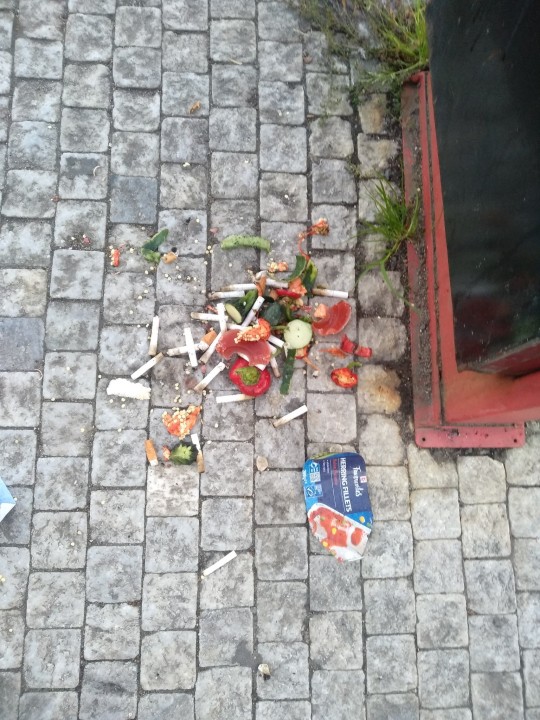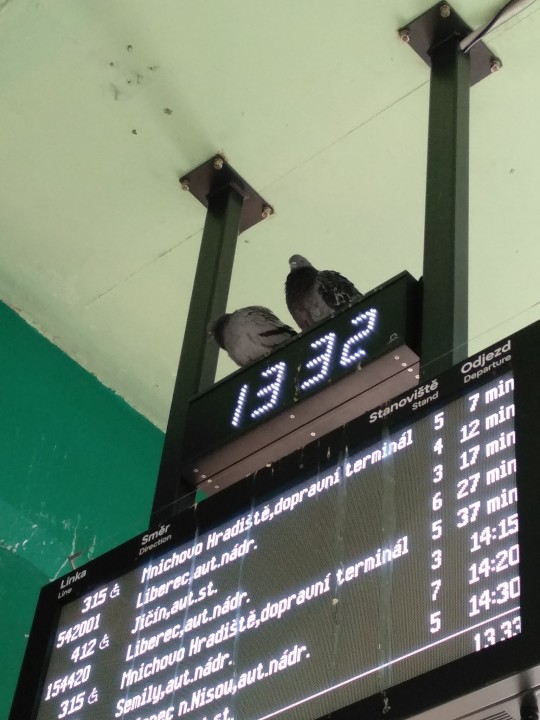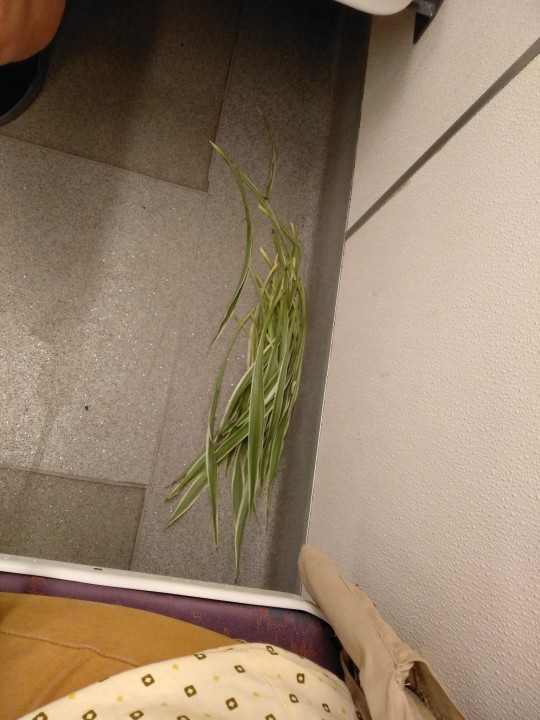#večeře
Explore tagged Tumblr posts
Text
já sice často z legrace říkám, že nejím nic jinýho, než hummus, ale já ho vážně zkonzumuju průměrně třeba kilo až dvě za týden😭😭
10 notes
·
View notes
Text
Takový to, když se rozhoduješ, jestli si k večeři dáš rum s colou, nebo kefír s borůvkama.
7 notes
·
View notes
Text

I have my own doodles too , loved this movie and finally can bully @johankasas with them a little bit,while she did bullied me with her favourite Czech movies

24 notes
·
View notes
Text

Starting prep for this years more restrained štědrovečerní večeře (Czech Christmas Eve dinner), below is a link to last years.
This year is way more modern with just the fried fish (which I marinade first), a warm German potato salad (I just can’t do cold) and mushroom hubnik.
21 notes
·
View notes
Text
Táta: "Babišovy voliče musíme pochopit a něco pro ně udělat, aby už Babiše nevolili, protože bez nich to nepujde."
malý brácha:"... a nebo je udělat bezvýznamnými."
9 notes
·
View notes
Text




@prazske-metro výběr mých oblíbených bizárků z vašich dopravních prostředků
#pravda. ta gurmánská večeře je ze zastavky tramvaje#ale jinak vsechno autentický a z posledních par měsíců#moje#pražákposting#metro#prague#cesky
19 notes
·
View notes
Text


Fotky večeře, zachycující čirou dynamiku hejna:
Česílko obezřetně pojídá svůj sušený banán ve dvířkách klece. Dělá to, abychom se náhodou neodvážili jí sprostě zavřít na noc. Zná naši hru, my známe ji. Za nepřetržitého očního kontaktu ukusuje svůj banán. Její pohled říká "Zkus to, hajzle". Náš pohled říká "Vážíš 70 gramů i s banánem a já mám protistojný palce". Napětí houstne.
Divuška absorbuje stravu zavěšená vzhůru nohama na zdi a s hlavou zabořenou v krmítku, protože je slepá a naviguje se čistě podle zvuků, takže když slyší Šalvěje jíst, připlíží se k němu zeshora jako ta mrtvá hospodyně z Ju-on (2002) a vytěsní ho z talíře nekompromisní vahou gravitace a feminismu.
Šalvěj sedí na bidýlku a zakřiknutě čeká, až jeho žena dojí. Přímo za jeho zády je další, zcela plné, milfkyprosté krmítko. Šalvěj si ho nevšímá, protože bez angstu by byla jeho postava míň zajímavá. Šalvěj je edžlord, trdloň a simp. ❤
76 notes
·
View notes
Text
Dneska večer u Vánoční večeře jsme ochutnali Marlenkovou kofolu. Byla dobrá! Chutná jako normální kofola, ale s krémovou karamelovou chutí, která se, alespoň dle mě, k základní chuti hodí.
Není to nejlepší příchuť (pro mě osobně vanilková), ale zdaleka není špatná.
24 notes
·
View notes
Text
*sedíme u večeře, maminka nejdražší provede poznámku o mých nově střižených vlasech, že prý vypadám jak Jánošík*
Já, zamýšlejíc se hluboce: Jánošík..? O tom psal Jirásek, ne?
Maminka nejdražší, nevěříc svému dítěti , googlí zdali Jirásek opravdu psal o Jánošíkovi: Máš pravdu.. Ale jak to tak z hlavy víš?
Já, v tu ránu spražena Věděním, si se stejným obdivem jakož i hrůzou vzpomínám na asi nejikoničtější post Čumblru vůbec:
"To je radši jedno…"

432 notes
·
View notes
Text
Věci z mého oddílu:
-Vždycky jednou za rok se jezdilo na týden na Slovensko. V den návratu se šlo do hospody na jídlo. Pojmenovali jsme to Poslední Večeře. K tomuto bodu se váže bod druhý: Nejezděte nočním vlakem českých drah s žaludkem plným halušek.
-Kemp je vždy zásadně cestou do kopce.
-Na vodu s námi vždycky jezdil Pavel. Už se nepamatuju, jestli se tak fakt jmenoval, či je to moje předmaturitní deluze. Pavel nepatřil k oddílu. Nevím o něm, koho z oddílu původně znal, nevím, co dělá mimo naše ježdění mimo vodu, nevím, jestli přestává existovat po tom, co skončí voda. Pavel je strážce písně Jdou krysy kanálem. Tato píseň není nikde dohledatelná, předává se čistě ústní tradicí. Ne, tamta to není. Jako jeden z velmi mála lidí jsem si dokázala zapamatovat píseň Jdou krysy kanálem a teď jsem také strážce Jdou krysy kanálem.
-Pokud není alespoň jednou za výjezd alespoň jednou bordel o půl druhé ráno v kempu kvůli opilým slovákům, nateče vám do stanu, coopy budou zavřený a borůvky vám zkysnou v hubě.
-Kolikrát stihne vedoucí zmínit vedoucí hru Sekeráček?
-Co se stalo v Helfenburgu? Starší se jednou za čas se zmíní o Helfenburgu a pak odmítnou elaborovat. Někdo v nějakém bodě hodil špagety, ale víc nevím. Hodní mě duch Helfenburgu.
-Vysvětlování názvu našeho oddílu, protože jsme si za jméno vybrali semi-obskurní kachnu
Ráda si přečtu o věcech z vašich oddílů
72 notes
·
View notes
Text
"Máš kde bejt na Vánoce?"
Udeřila tradiční předvánoční deprese. Osamělost je bezedná propast, já zírám do ní a ona na oplátku zírá do mě. Když se k ní přidaj depresivní stavy, mění se v černou díru požírající každej foton světlý myšlenky, co si náhodou dovolila se v mozku urodit.

Vídat se s kámošema moc nepomáhá, skoro všichni maj drahý polovičky a děcka. Dvě nejbližší kámošky celou dobu krafaj o dětech, kdo už vyrostl z jakejch hadrů, jak který v noci spí, co jí a nejí a kam je plánujou dát do školky. Pak si vzpomenou, že tam vlastně sedím taky, a ze slušnosti se zeptaj, jak se maj morčata. Když se pokusím nahodit jiný téma, po pár větách jsou zas u děcek.
Vlastní děcka nechci, ale rodinu bych chtěla. Za rodinu teda považuju už dva lidi, ale kdyby partnerka už děcka měla, nejsou na překážku. Jenže nedaří se - nikomu nikdy nejsem dost, každá by chtěla, abych se v něčem změnila nebo si to rozmyslela s těma děckama. (Jako by AuDHD matka a vysoce pravděpodobně autistický děcko nebyl recept na ještě větší a jistější osamělost...) A když se teda snažím nacpat do její představy o ideální přítelkyni a posouvám svoje vlastní hranice až k nepoznání, tak mě deprese a úzkosti žerou zaživa a "už nejsem ta veselá pohodová holka jako dřív". No a nebo maskuju jak o život a stejně přijde "jsi skvělá ženská, ale..." tak jako loni před Vánocema.
Loni jsem u štědrovečerní večeře u našich bulela jak alík, letos to snad bude lepší. Autistickej synovec se na mě vždycky těší, říká mi "tetoooo" a obejme mě. Táta se mi beztak zas pokusí dohazovat svoje single kámoše, i když jsem jasně řekla, že pokusů s chlapama už bylo dost. Máma mlčí. Oba jsou čím dál zahořklejší, protože jejich sourozenci už maj kupu normálních vnoučat, kdežto my dva s bráchou jsme zvládli dohromady jedno postižený děcko.
Veselý Vánoce.
#actually autistic#autism#audhd#actually audhd#neurodivergent#czech#česky#neurodiversity#christmas blues#tw depressing stuff
7 notes
·
View notes
Text
Předevčírem jsme byli s jeho částí rodiny na večeři na takovém místě, kde to probíhá formou švédských stolů. A nesu si odtamtud pár vjemů.
Jedna paní stála za mnou, když jsem si brala jídlo, a já ji neviděla. Jako vždy mi to trvalo, a když jsem si jí všimla, omluvila jsem se, že zdržuju. A ona úplně flegmaticky: "V pohodě, v klidu, nikam nespěcháme." To se mi fakt moc líbilo, úplně mě hodila do klidu.
Pak tam přišel pár s dítětem. Paní ke mě seděla bokem a pokaždé, když jsem si šla pro jídlo, se na mě divně, možná odsuzovačně dívala. To mi zase náladu kazilo, i když to, co ona si o mě myslí, mě absolutně nezajímalo, přes názory (cizích) lidí jsem se už přenesla. Paní evidentně jenom pila, (kupa prázdných sklenek na víno po stole), a můj apetit se jí asi hnusil, no co.
Potom tam přišel pár, na který jsem se dost dívala. Oba mobili v ruce. Strašně moc smutný. Já bych ty krámy fakt už zakázala, kolik neštěstí a utrpení už kvůli nim bylo... jiní lidé naštěstí (aspoň většinu času) mluvili mezi sebou.
Líbilo se mi, že tam byla i jedna paní s dcerou, oblečené jak na cestě do sámošky mezi těmi honosnými stoly a při bluesu linoucího se z repráků, a mě to přišlo boží, že spolu vyrazily a takhle krásně strávily čas.
Ke konci tam přišel ještě jeden zajímavý pán. Opět tam vůbec vizuálně nezapadal, zarostlej s tričkem od nějaký divoký kapely, a nesl si s sebou krabici lega pokojovek, to bylo taky strašně super.
A za celou několika tisicovou večeři za celou rodinu jsme platila já. Protože.
3 notes
·
View notes
Text
Ruce se chvějí,
srdce ti buší,
líbáš ji do klína,
její stehna zakrývaj ti uši,
od večeře chutné,
nic tě neruší.
3 notes
·
View notes
Text






Dnešní večeře s bráchou. 🙂 Kartičky brácha nesbírá, tak mi je dal do sbírky. 🫶👍❤️
2 notes
·
View notes
Text








Mushroom puddings in various forms were common in the past upon the Štědrovečerní večeře (Christmas Eve) table. The version that I adapted is from Pojizer and the Krkonoše Mountains in the north of the Czech Republic bordering Poland. The version that my Moravian ancestors to the south made would have used semolina instead of bread.
I usually make hubník sometime between Christmas Eve and Three Kings Day. This year I made it on New Year’s Day.
My weirdo Hubník
Hubník is supposed to be made with dried 🍄🟫 , which my Czech ancestors almost certainly would have had on hand. However, in my rural grocery stores not so much, and I never think to order ahead of time. I use a LOT of chopped mushrooms. Three or four cups. I really like mushroomy hubník.
No dried mushrooms means no mushroom broth from rehydrating, so I use chicken or beef broth (unless I make it for meatless Christmas Eve, in which case I just use a little water). Although since I don’t generally have stale bread on hand sometimes the milk and the eggs provide plenty of moisture.
Also, I used bagels, and the bagels I had on hand were everything bagels. But, you know what? I really wanted to use round bread—because I AM in the middle of a solar festival. Half of my mushrooms were round and of course, nice round, golden egg yolks. Go sun! 🌞
I personally felt that the everything seasoning went just fine with mushrooms.
And, I don’t usually have semolina flour on hand and I’m not about to buy it for 2TB. Since the lovely Czech lady from whom I adapted the recipe also mentioned cream of wheat (which I also don’t have on hand) I used grits. This is a home in the Southern US—grits we have!
I used bacon fat from last night’s round meal (pfannkuchen) as my solid fat to grease the pan.
I feel like my ancestors probably adapted all the time depending on if times were plenty or lean, so I’m not the least bit upset about my hubník not being an exact recreation. Hmmmm . . . much like my personal spiritual practice. 😉

This is one of my favorite foods—and I’m so happy that my husband doesn’t like bread pudding and my mother-in-law doesn’t like mushrooms. It’s all mine, mine, mine.
🍄 🍄🟫 🍄 🍄🟫 🍄 🍄🟫 🍄 🍄🟫 🍄 🍄🟫 🍄 🍄🟫 🍄 🍄🟫 🍄
18 notes
·
View notes
Text
holandské suvenýry a tak trochu už nemůžu
mozek už měl dospět, aspoň to říkaly všechny memes o pětadvacátých narozeninách, nicméně uběhlo osm měsíců a asi se to stále nestalo jak jinak vysvětlit, že jsem letěla do Holandska za týpkem z Bumble, kterého jsem nikdy předtím neviděla? matchli jsme se, když jsem ze své hrdosti seděla sama v baru a pila negroni, uplakaná s rozečtenou Lolitou ve slovenštině, druhý den odjíždí, ale uchvacuje mě, natolik, že si píšeme i druhý den, kdy přejíždí hranice, pokračujeme ve psaní, intenzivní, neustále, fascinuje mě jeho angličtina, jeho hravost, jeho inteligence "tak si ty kytky zasaď u mě na zahradě" "a jak to mám asi udělat? když bydlíš dvanáct hodin autobusem ode mě?" "letadlem je to jen hodina" "tak jo" nejdřív jen z legrace říkám, že si koupím letenku, a pak nad tím přemýšlím, mám čas i peníze, tak proč ne? dělám si legraci, že mi možná ublíží, ale doopravdy z něj nemám špatný pocit, věřím mu. tak jsem koupila letenku. píšemem si mixem jazyků. hlasové zprávy. pampelišky. slova a slova a slova. kamarádi si myslí, že jsem se zbláznila. přiletěla jsem. je extrémně vysoký, na to se nemůžu vynadívat. večeře v italské restauraci, příjemná atmosféra, směju se. italské, ani holandské pivo mi nechutná. obchod s trávou, co vypadá jako recepce pětihvězdičkového hotelu, prodavači v kravatách, dřevěné obložení, zlaté lustry. příliš rychle mě líbá a na mě poprvé doléhá tíha situace. on je opravdu neznámá osoba, jsem několik stovek daleko od domova sama, teď si budu muset vyžrat to, jestli se mi něco stane. pláču. nějakým způsobem jsme to vykomunikovali. bojím se očekávání. usínáme a ráno máme sex, prochozený den v upršeném Utrechtu, smích a narůstající zlaté pocity k němu, když mluví s cizími důchodci. roleplaying vztahu, na (pro mě) neznámých ulicích se držíme za ruku, líbáme na eskalátorech, prokleté pusy na čelo a celé to rychle uteče a já zase letím pryč. zmatená. kdybychom se už neviděli, tak to přežiju, ale jestli se uvidíme znovu, budu moc ráda. pokračujeme ve psaní a je to ještě intenzivnější. vím, že to nějakým způsobem ovlivňuje mě celou, mé výkony v práci, mé soustředění a vnímání, nedávám pozor, co říkají ostatní, jen odepisuji. zvrhává se to v sexting, nikdy mě nikdo takhle nevzrušoval, neokupoval moji mysl, na nikoho jsem takhle nemyslela u masturbace. pohlcuje mě to celou. a tak je řada na něm. přilétá. jenomže, volali jsme si asi dva dny předtím a byla to intenzivní konverzace, u které pláču. zvyšoval hlas a pak mi napsal prosbu, která pochroumala moje ego, což jsem si racionálně uvědomovala, ale zase se objevil červík v hlavě. chuť utéct, ale to přeci nemohu. přilétá a já jsem celá nervózní, až po několika pivech a brcích se cítím lépe, příjemně. (hrozně moc se mi nechce zacházet do všech detailů, asi to příliš bolí, nechci nad tím přemýšlet, protože pak bych plakala, takže to neshrnu všechno). spí u mě jen dvě noci a pak to končí. ale o tom možná jindy, protože je to komické. rozloučili jsme se, uplakané ráno, den zakončený skvělými koncerty a pak večerem v Sute, slavilo se 20 let a samozřejmě je tu první Jan a já přemýšlím, že za ním chci jít a mluvit s ním. což jsem našla tu odvahu a nejsem si jistá, jestli jsem mu jako první větu neřekla, že důvod, proč mě přitahuje, je to, že on mě nechce. nakonec jsme spolu do pěti do rána. mnoho piv a zakončujeme to lahváčema na Míráku. kdybych si tajně nenahrávala naše rozhovory, tak druhý den nemám tušení, co se řeklo. kocovinu léčím pivem a poslouchám naše hlasy dvě hodiny. stále dokola ve smyčce, on říká, že nejsem dostatečně transparentní a já mám pocit, že jsem před ním vyblila duši. některé věty uklidňují. nikdy ses přede mnou neztrapnila a ani to nikdy nebude možné. dozvídám se, že ho zajímám, že mu vadilo, že jsme se půlroku nebavili, že se mi stranil, protože slyšel, že mám kluka. donekonečna nadhozená otázka "co my, co s námi, pojďme to debatovat, definovat", ale na žádné řešení nepřicházíme, jen jsme se domluvili, že se potkáme někde mimo Sute. to be continued...
9 notes
·
View notes